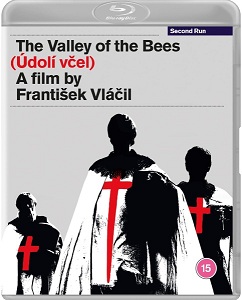'THE VALLEY OF THE BEES'
(1967)

- A review by Richard Harrison (2024)
It is perhaps appropriate that, in his centenary year, Frantisek
Vlacil’s film The Valley of the Bees has been released in a
remastered BluRay edition by Second Run – a company who have done more
than any other to promote and propagate less familiar films from
Eastern European cinema. Given the success of his previous film,
Marketa Lazarova, Vlacil’s follow-up perhaps
surprisingly mined very similar ground – but (commercially at least)
found a very different outcome.
Given Hollywood’s fixation with colour cinematography (one recalls
films as disparate as The Graduate and Bonnie and Clyde),
and
its
influence
on other European films, The Valley of the Bees
is shot in crisp monochrome, and is more akin to The Seventh Seal
rather than its late 1960s compatriots. This said, Vlacil’s film does
reflect the growing violence prevalent in cinema in the late 1960s, and
contains some shocking (and unmotivated) moments of savagery.
Ondrej, our protagonist, starts out an idiosyncratic teenager but
swiftly becomes a Knight of the Teutonic Order. The early scenes of his
“initiation” and friendship with Armin feel rather short in the great
scheme of things, particularly the striking scenes of them on the
seashore. The composition throughout The Valley of the Bees is
literally colourless and washed-out, a visual equivalent of Robert
Bresson’s audial sparseness. The effect of this is that there is no
distraction – the atmosphere of the 13th Century is almost tangible.
In terms of plot, The Valley of the Bees echoes its sparse
cinematography. Despite being significantly shorter than Marketa
Lazarova, it is still a film where not a huge amount happens. But,
it is less about what happens but about why it
happens. Thus, several key events in the film are puzzling in their
apparently unmotivated barbarism – but that is sometimes the case with
tragedies in life itself; there is no explanation for every piece of
human behaviour except that the person doing the action is indeed
human. Thus, Ondrej’s nature is at several points questionable, as he
becomes to some extent an anti-hero. But, as with its violence,
the film poses several interesting questions about the nature of
family, roots and friendship – to say nothing of the notion of
belonging.
With a film like The Valley of the Bees (previously available
as part of a Vlacil DVD boxed set), Second Run offer us an opportunity
– a rare and valuable chance – to submerge ourselves in the European
cinema of the 1960s. Much like the milieu of the 1960s music
scene was much more than the Beatles and the Stones, European cinema of
the 1960s was more than just Godard and Fellini. By pushing seemingly
reluctant titles into the spotlight Second Run once again shows the
value of its very essence, as it is enabling a much wider perspective
of 1960s cinema to take place.
This newly-remastered HD BluRay disc comes with several worthwhile
extras including a pair of Vlacil’s documentary films from 1972, a
commentary and a 24 page booklet.
The Valley of the Bees is available now direct from Second Run
or from your favourite retailer.
Second Run DVD website
Back
Home

